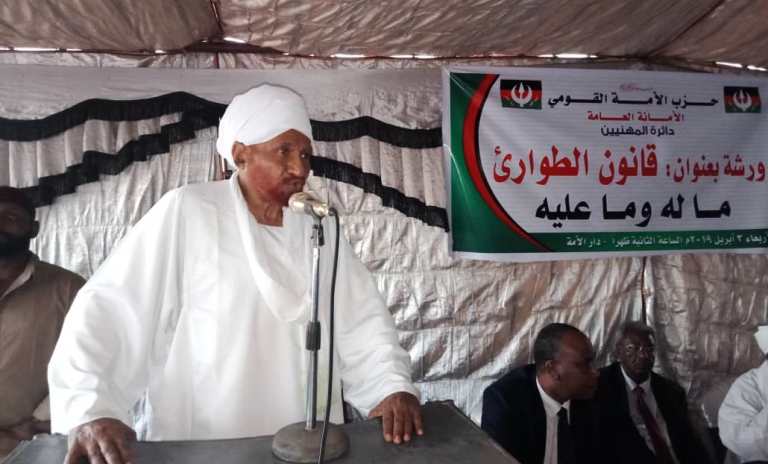Sudan’s state of emergency aimed to maintain al-Bashir’s regime: al-Mahdi

April 3, 2019 (KHARTOUM) – Sadiq al-Mahdi, the leader of the opposition Umma National Party (NUP) renewed on Wednesday his rejection of the state of emergency saying it aimed at enabling the ruler to remain in power.
Al-Mahdi, who is also the chairman of the opposition Sudan Appeal alliance, delivered his remarks at a workshop held by his party at its premises in Omdurman to discuss the state of emergency imposed by President Omer al-Bashir last February after the outbreak of anti-government demonstrations.
“What Sudan is living is a political occupation,” he said.
“There are rulers who issue constitutions and laws that are supposed to be derived from the will of the people. Every constitution that emanates from the will of the ruler is just instructions, the same for any law that has not been issued by an elected legislature,” he further stressed.
The Sudanese government says that the state of emergency aimed at dealing with the economic situation and to fight corruption as well as to stop practices casting negative effects on economic affairs, especially the smuggling of gold.
The Mahdi, speaking at the end of the workshop, he said the discussion has shown that the emergency law did not agree with the constitution and violated it.
“The important thing now is that the Sudanese people woke up after 30 years, united to regain their rights,” he said.
He added that the unity of the opposition should focus on the establishment of a constitution expression the will of the people and laws that emanate from an elected legislative assembly will working together with an independent judiciary.
He further alluded that the ruling Islamist regime does not, in fact, apply Islamic law.
“Participation, accountability, transparency and rule of law are the basis of governance in Islam,” he said, “in addition to the principle of social justice”, which is an addition introduced by the Tunisian revolution”.
He also said that the absence of a democratic rule in the majority of Arab countries should not be linked to Islam, and pointed to the existence of a democratic system of government in non-Arab Muslim countries such as Turkey, Indonesia, Malaysia, Senegal and Nigeria.
(ST)
